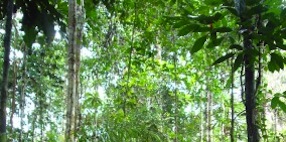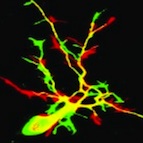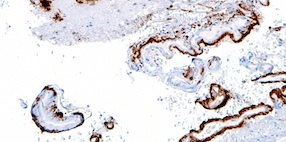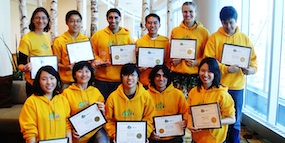 |
UBC Science Connect |
| NEWS AND EVENTS FOR UBC SCIENCE ALUMNI | VIEW HTML VERSION |

|
Global Warming Will Reduce Populations of Plant-eatersRising world temperatures will cause most populations of herbivores – including plant-eating fish – to decline, according to a UBC biologist. That prediction resulted from updated mathematical models that integrate fundamental biological effects of temperature with the way herbivores and plants interact. These models were combined with data from experiments using “mini-ecosystems” of phytoplankton and zooplankton co-existing in four-litre tanks set to different temperatures over eight days. As expected, higher temperatures increased the metabolisms of both plants and animals, but the effect on animal metabolisms was more intense. The zooplankton consumed more phytoplankton as a result. But the plants could not keep pace with the animals’ increased appetites, and the lack of food ultimately led to a decline in the animals’ numbers. “Herbivores are going to need more food than the plants are making just because of the higher temperatures,” says Mary O’Connor, an assistant professor of zoology who co-authored the article, published online by The American Naturalist. “Eventually, the system is limited by how fast the plants can grow.” |


Beyond the Magic at Chemistry's Open House
You're invited! The Department of Chemistry at UBC is throwing open its doors to kids of all ages for a fun-filled day of hands-on activities, shows and tours. Taste liquid nitrogen ice cream, build marshmallow molecules and watch chemistry magic in action!
Apple Festival Extrasolar Parents Polar Bears in a Changing Arctic Problems with Pixels? |
 |

UBC Biologist Wins MacArthur 'Genius' Grant
Sarah Otto, a zoology professor and director of the Biodiversity Research Centre at UBC, is one of 22 people to be picked for this year’s round of ”genius grants” from the John D. and Catherine T. MacArthur Foundation. Otto, a theoretical biologist, has focused on fundamental questions of population genetics and evolution, such as why some species reproduce sexually while others reproduce asexually, and why some species carry more than one copy of each gene. She has helped to make mathematical modeling a more accessible tool for fellow biologists, having co-authored a textbook on the power and rigor of quantitative analysis in biology. MacArthur Fellows, as recipients of the grants are formally known, receive $500,000 payable over five years, no strings attached. Candidates, who must be citizens or residents of the U.S., are nominated by a specially selected group of about 100 people (their identities are not disclosed), and are chosen by a selection committee of about a dozen people (whose identities also are secret). Candidates are selected for their “exceptional creativity, promise for important future advances based on a track record of significant accomplishment, and potential for the fellowship to facilitate subsequent creative work.” “As an evolutionary biologist at UBC, where I’m surrounded by so many creative people, I’ve been able to go places intellectually that I otherwise might not have explored,” Otto says. “The MacArthur Fellowship gives people the freedom to be creative, giving them room to focus on what they do well,” Otto says. “So I am going to take that to heart and carve out more time for the math and science that I love doing.” |

MESSENGER Data Paints New Picture of Mercury's Magnetic Field |
||
|
Catherine Johnson, a UBC geophysicist is part of a NASA mission that is analyzing the first sets of data being collected by MESSENGER as it orbits Mercury. The spacecraft is capturing new evidence that challenges many previous assumptions about our innermost planet. Analyses of new data from the spacecraft reveals a host of firsts, including observations of the planet’s global magnetic field.  |
 |
The results are reported in a set of seven papers published in a special section of Science magazine. Johnson, along with colleagues at Johns Hopkins University’s Applied Physics Lab, Goddard Space Flight Centre, University of Michigan and the Carnegie Institution, analyzed the data collected by the spacecraft’s magnetometer to detect Mercury’s magnetic equator and paint a never-before-seen picture of Mercury’s magnetic field.“The MESSENGER data has allowed us to establish the large-scale structure of Mercury’s magnetic field,” says Johnson. “Mercury’s field is weak compared to Earth’s. But until now, figuring out exactly how much weaker has been a challenge.” |

entrepreneurship@UBC Seed Accelerator Competition Heats Up on October 20th |
|

|
Join us for the “entrepreneurship@UBC Seed Accelerator Competition” on October 20th. Five new ventures from the UBC community will be pitching to become the first recipients of investments between $25k and $100k from the entrepreneurship@UBC Seed Accelerator fund. Come see what it takes to secure up to $100k. |

What’s so unique about the tropics? UBC researcher says: “Less than we thought” |
||
|
The temperate forests of Canada or Northern Europe may have much more in common with the tropical rainforests of Southeast Asia or South America than commonly believed, according to a research group led by a UBC ecologist. The assertion, published in the journal Science, is focused on the concept of “beta-diversity” – a measure of the change in species composition between two sites, such as neighbouring patches of forest.  |
 |
Typically, beta-diversity increases as you move from the poles towards the equator, often leading ecologists to conclude that there is something inherently different about the ecology of the tropics. But a group led by Nathan J.B. Kraft, a postdoctoral fellow at UBC’s Biodiversity Research Centre, challenged this interpretation. Using an extensive dataset and computer modeling, the researchers demonstrated that current patterns of beta-diversity are much more similar than ecologists once thought. “For decades now, ecologists have gone to the tropics to try to explain the often incredibly high diversity found there,” says Kraft. “But what our results show is that the same ecological mechanisms might operate in similar ways in Costa Rica and Calgary.” |

Mark your Calendars! UBC LSI Presents Café Scientifique |
|

|
Join us on November 21st for Café Scientifique: Seeing is Believing. Researchers at the Life Sciences Institute are exploring the molecular and cellular details of life as it relates to health and disease. Kurt Haas, Brain Research Centre, Shernaz Bamji and Doug Allan, CELL Research Group, on imaging the developing and aging brain. |

UBC Researchers Find New Culprit in Alzheimer’s Disease: Too Many Blood Vessels |
||
|
UBC scientists may have uncovered a new explanation for how Alzheimer’s disease destroys the brain – a profusion of blood vessels. While the death of cells, whether they are in the walls of blood vessels or in brain tissue, has been a major focus of Alzheimer’s disease research, a team led by Wilfred Jefferies, a professor in UBC’s Michael Smith Laboratories, has shown that the neurodegenerative disease might in fact be caused by the propagation of cells in blood vessel walls.  |
 |
Jefferies, in an article published online by PLoS One, theorizes that the profusion of blood vessels is stimulated by amyloid beta, a protein fragment that has become a hallmark of Alzheimer’s disease. The blood vessel growth, or “neo-angiogenesis,” leads to a breakdown of the blood-brain barrier – the tightly interlocked network of cells that allows oxygen-carrying blood to reach brain tissue while blocking harmful substances, such as viruses. “When the blood vessels grow, the cells of the vessel walls propagate by dividing,” Jefferies says. “In the process of splitting into two new cells, they become temporarily rounded in shape, and that undermines the integrity of the blood-brain barrier, potentially allowing harmful elements from outside the brain to seep in.” |

UBC Science Likes You |
|

|
Visit us on Facebook and you can like us too! Connect with classmates, share stories and updates and discover what's new by checking out the UBC Science page on Facebook. We'll be posting news from the Faculty, as well as volunteer opportunities and event updates--and we promise never to tag you in any unflattering photos. |


Sabine Lague |
 |

UBC iGEM Team Has Winning Weekend
The UBC iGEM team had a winning weekend at the iGEM Americas Regionals synthetic biology research competition held this past weekend in Indianapolis. The UBC team earned a gold medal status for their research project and won a special award for Best Model. This is the best showing for UBC. The team will now advance to the World Championships held at MIT in Boston from November 4-6th. UBC Physicist Awarded 2012 Lars Onsager Prize UBC Computer Scientist Receives SIGSOFT Retrospective Impact Paper Award UBC Statistician Awarded American Statistical Association Fellowship UBC Mathematics Head Appointed Senior Advisor to the Provost on Women Faculty |

 |
|

|
» 2000
UBC spin-off company QLT begins sales of Visudyne, the world's first treatment for age-related macular degeneration, the most common cause of blindness. Based on the work of UBC chemistry professor David Dolphin and immunologist and alumna Julia Levy, the drug has saved the vision of approximately 500,000 people, and QLT has gone to become UBC's most successful spin-off. |

 | ||
You're receiving Science Connect because, as a UBC Science alumni or supporter, you've given the university permission to contact you. And while we hope you find our e-magazine interesting, we take your privacy seriously, and have made it easy for you to: | ||
 |
||

 |
| © 2011, UBC Faculty of Science | Privacy | Update your contact information |

